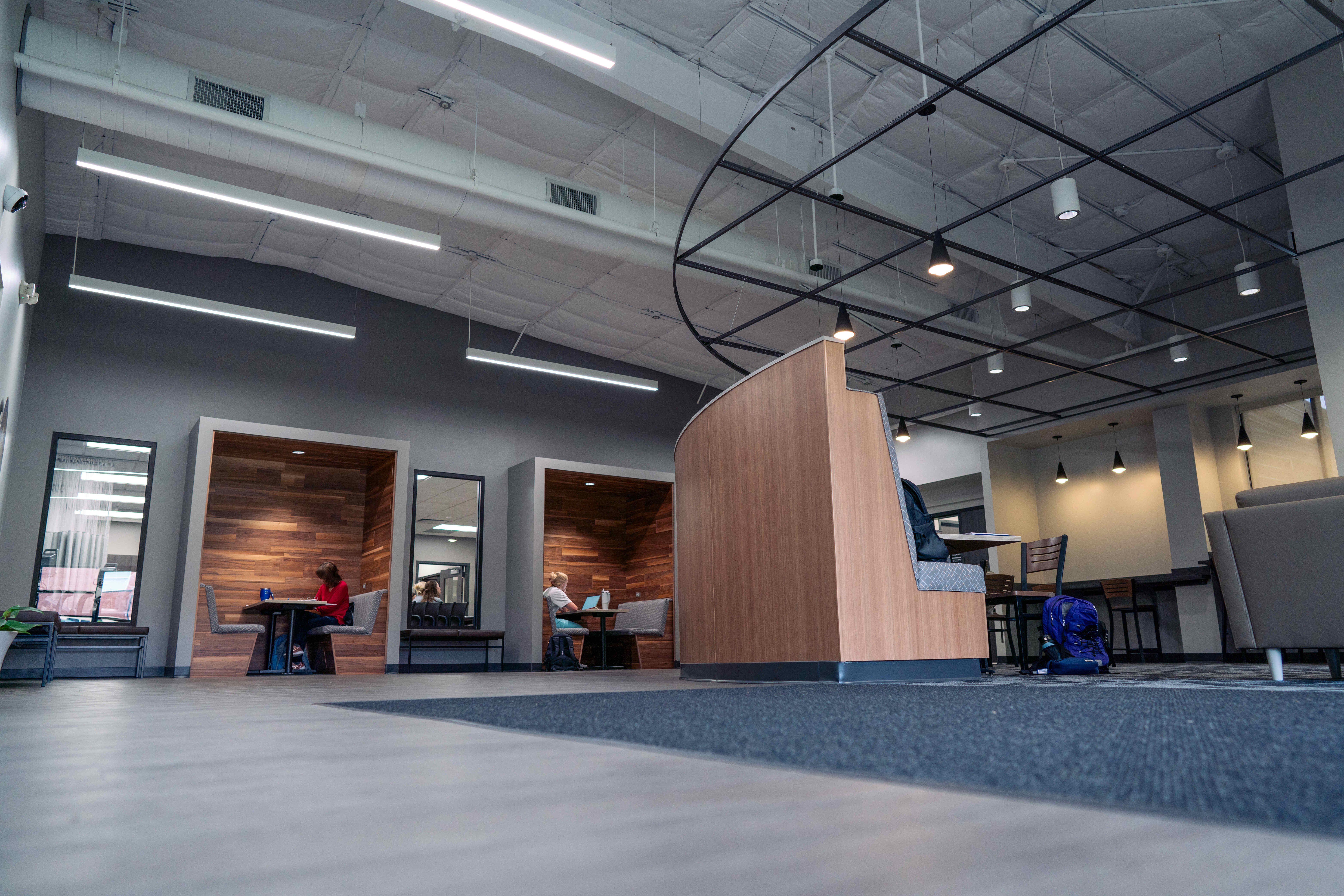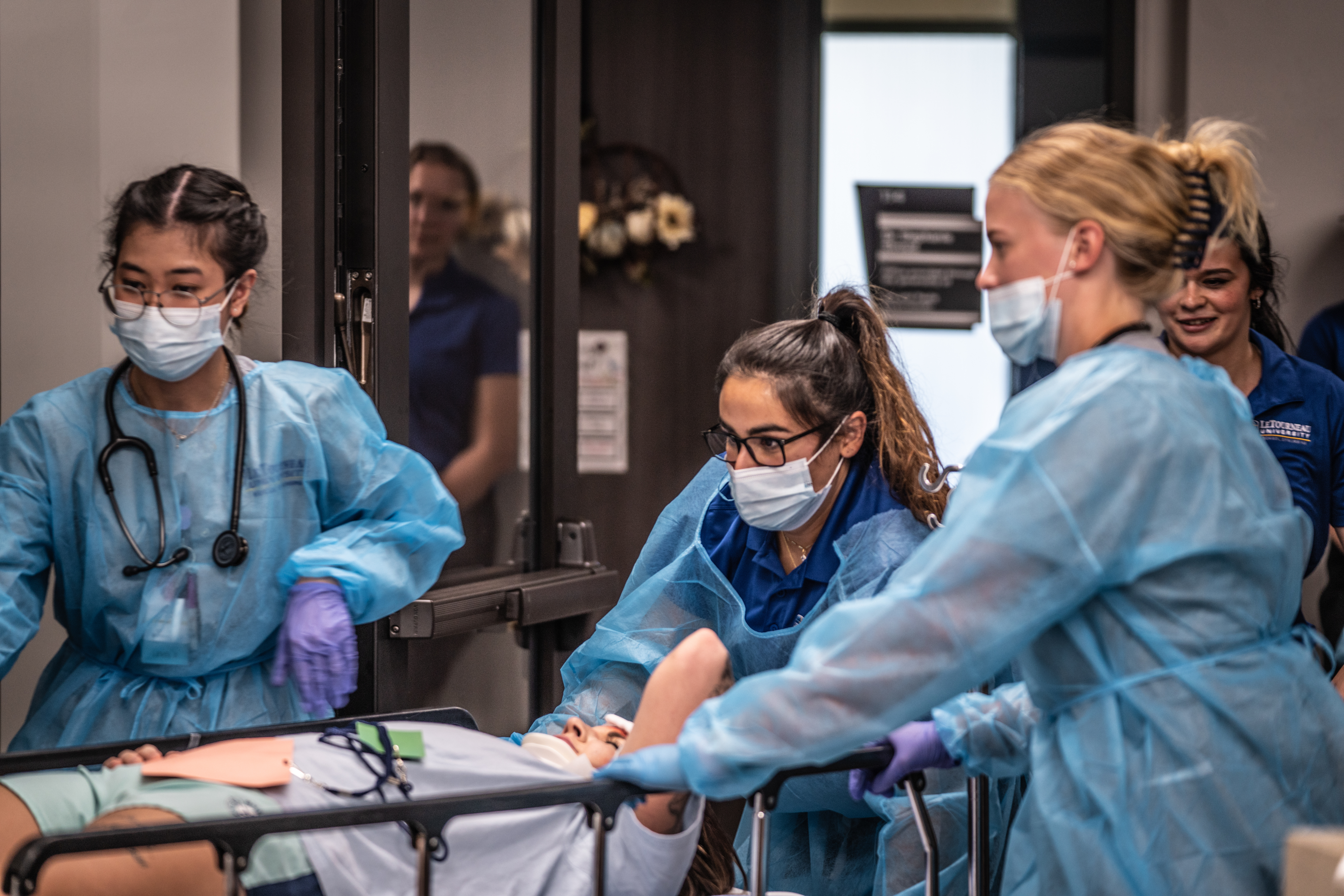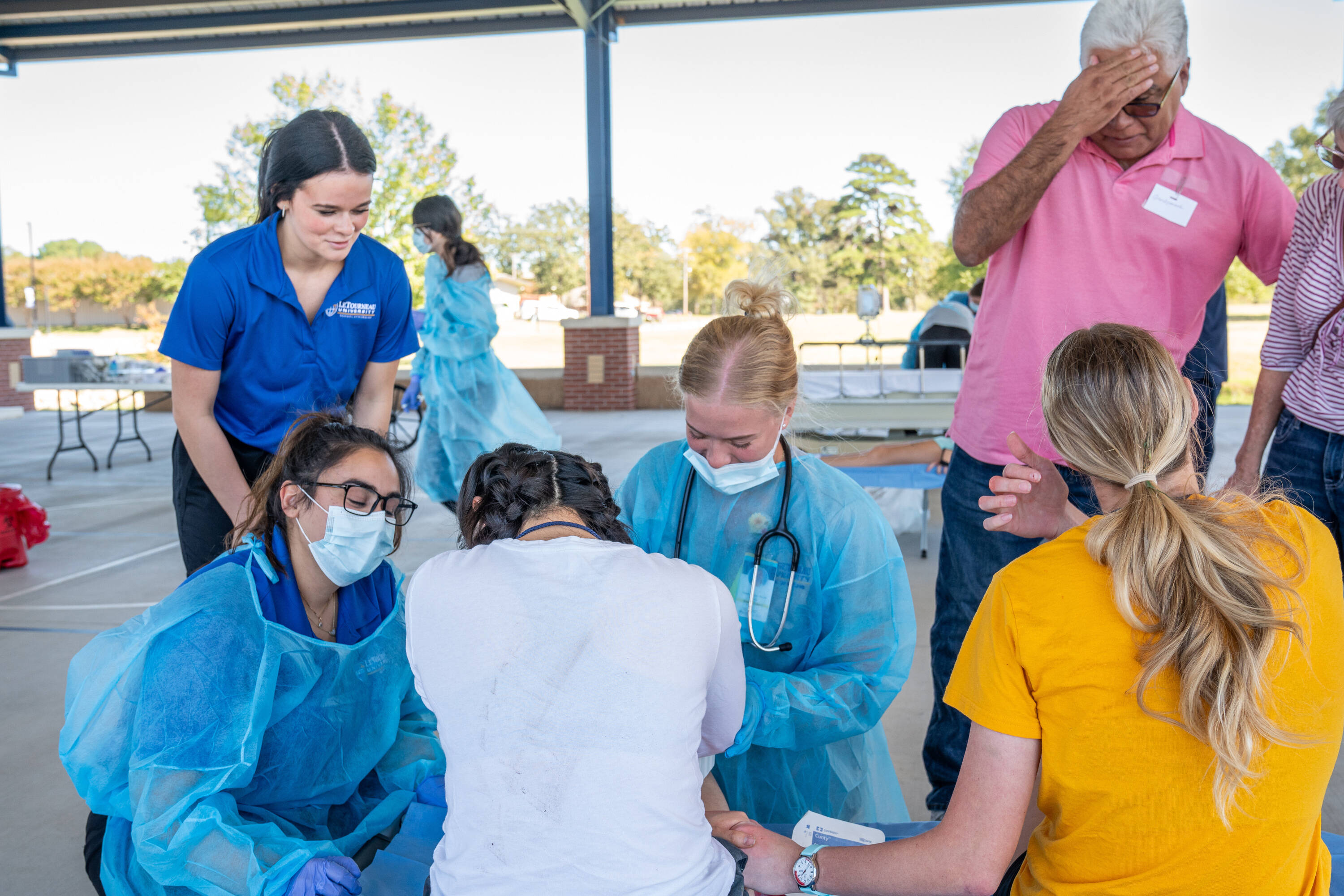
Straight from the headlines: Nurses Experiencing Burnout. Staffing Crisis is Bad and Getting Worse. The Coming Collapse of the U.S. Healthcare System.
It’s been nearly four years since the world turned upside down due to the COVID-19 pandemic, and no industry has changed more than healthcare. Frontline healthcare workers, especially nursing professionals, have experienced the brunt of the change. In a field that already calls for long shifts, extra hours, and high physical demands, nurses were tasked with carrying the weight of overloaded patient wards and constantly full emergency rooms. Hospitals and healthcare facilities were already facing staffing shortages and other issues before the pandemic began, and now, according to many, it has reached crisis levels.
What does nursing education look like in this new landscape, and what type of nurses are needed in an industry that has changed so monumentally? We sat down with nursing faculty members, Dr. Kimberly Quiett, RN, DNS, Dean School of Nursing, and Rachel Davis, RN, MSN, Assistant Professor of Nursing, to get their perspective.
The Current State
In her own words, Rachel Davis:
My background is in bedside nursing, caring for patients who come from the ICU. When I started in that position, there were a lot of seasoned nurses, with 15-20 years of experience, and I had many great mentors to guide me in my nursing journey. Towards the end of my time working in bedside care, right before Covid, they started shifting the patient to nurse ratios (the number of patients that are given to one nurse) because there weren’t enough nurses. A lot of good nurses left shortly after that, either transitioning to other areas of the hospital that didn’t require that sort of intense labor or leaving the field altogether.
Most of the nursing issues I researched in grad school all circled back to staffing—nurse burnout, early retirement, leaving the field completely—and a lot of it came down to safe patient-nurse ratios. The media isn’t wrong and a lot of the research isn’t wrong, there is a shortage. Now, we’re seeing an incline in the staffing numbers, but they’re all brand new nurses. So, you have a floor of four to five nurses taking care of 22 patients, and most of them have only been nurses for six months. When I left my previous position, I was the senior nurse and I had only been a nurse for a year. So, yes the employment numbers are increasing, but our seasoned nurses are leaving.
To make matters worse, baby boomers are retiring, co-morbidities (deaths due to multiple illnesses) are on the rise, and all of those patients are coming into the hospitals. So, even though the employment numbers are rising, our sick population is increasing as well. Also, our patients are a lot sicker now than they were even ten years ago. In the past, you’d have a patient come in with one diagnosis, and now they come in with multiple: heart failure, kidney disease, diabetes, etc. Mental illnesses are also increasing, so behavioral health units are overwhelmed and do not have enough staff either. So, essentially you have a lot of new, inexperienced nurses in our hospitals. To make critical judgments and snap decisions in those situations, you need experience. So, that puts more pressure on those who have been in the field longer to makeup for that lack.
If I could choose one phrase to describe my experience as a nurse during Covid it would be a sense of helplessness. As nurses, we take an oath to care for our patients and to help them get better. To walk into your patient’s room and know that might be the last day you take care of them because they’re not going to make it…you just feel so helpless.
I had to lie to my patient because I couldn’t tell him he wasn’t going to make it. Because if I give up hope, he’s not going to fight anymore. We were doing everything we could, all the orders and late nights and long shifts, doing the same things over and over and nothing was getting better. A lot of nurses never have to experience watching someone take their last breath, but unfortunately, nearly every nurse experienced that in some capacity during Covid.
Dr. Kimberly Quiett adds:
During Covid, things were really bad, staffing and resource management, etc, and that took a toll, so a lot of people left the profession. I think that makes this level of education even more important because we’re having to backfill a void that was left by all of those nurses.
So, nursing schools need to graduate more nurses, but we can only graduate as many as we have enrolled. Which means we need to grow enrollment at LeTourneau right now, and we must also make sure we have the faculty and the clinical/lab space we need as we’re trying to fill this giant void in the workplace.
The Importance of Embodied Nursing Education
Dr. Quiett:
There is also a huge push in nursing to disembody nurses and nursing education through online programs where students do clinicals but they don’t do it under the direct supervision of faculty. This really puts the profession of nursing at a disadvantage because those students don’t have the same level of education as nurses who were clinically trained at the bedside by faculty members. So, I think the way LeTourneau does education really helps students think more about what they’re doing. It’s not unusual for a faculty member to pull a student aside and say, “Hey, let’s talk about what just happened,” or, “What were you thinking when you made those decisions.? Those are the kinds of things we need students to learn.
Furthermore, Christian education is such a foundational part of what we do at LeTourneau. Our professors demonstrate and model Christian compassion and care for others to say, “The reason we treat this person just like everyone else is because they’re a child of God.” You don’t get that kind of training in an online program. At a patient’s bedside, you have to be able to think through what’s going on and how to handle it. If you have someone do it for you and you’re just watching, you’re not going to learn that thought process. But, if you have a faculty member there coaching you, you’re much more likely to make the right decision, and the right decision could mean the difference between life and death for a patient.
When I look at the state of the industry today, I think, ‘How did we get to a point where it’s OK not to care about people or not to tell people about their treatment options or educate them about what’s going on with their health?’ Those things are important because they convey a value and an importance to individuals as people. I think we’ve lost a lot of that in our profession, where nurses are technically skilled and can do all of these things, but they don’t even make eye contact with a patient or acknowledge other things that might be happening in their lives.
I wish we would come back to a place where the value of a human life is foremost in our minds, and not just how much we can do or how many lives we can save by being heroic. How can we make people feel valued and important in their care? If we can have more nurses in the workplace who were taught from a foundation of understanding the value of people, then we’re going to have a better nursing profession.
It’s All About the Patient
 Davis:
Davis:
My favorite part about bedside nursing is the patient connection: walking in and being able to take care of someone and knowing they trust you. On one of their worst days, you get to be their hope and their comfort. Coming here and working with the staff and students, it was very evident they had the same vision for nursing, and not all nursing programs have that. It’s a heart thing here. Something we say often on our hallways is that nursing isn’t a career, it’s a calling. Once you lose that calling, that’s when the job gets really hard. I feel like a lot of the nurses who quit, maybe they were there for a good job or money or advancement, but for those who really put their heart and soul into it, it was a privilege for them and they didn’t want to leave.
Just yesterday, my students were in the hospital, and their patient had to have a procedure done. He had no idea what it was, why they were doing it, or what to expect. The doctor explained it to him, but it was way over his head. So, my students were actually able to educate the patient on the procedure, and they were so excited. They came to me afterwards and said, “Mrs. Davis, we got to educate the patient, we got to advocate for him!” They were so happy to be able to care for him in that way.
In our transition to pre-nursing class, one of the very first chapters I teach talks about patient care; your main objective when you walk in that room is to talk to your patient, not about your patient, not what you’re going to do, but talk to them and see how they feel about what’s happening to them and if they understand it. You let them know that you’re there, they can trust you, and you’re going to help them the best you can. That’s the very first thing they learn in nursing school.
Fostering the ‘Heart’
Dr. Quiett:
Our students learn compassion, they learn heart, not because of content we teach out of a textbook but because they have faculty members at their side who are demonstrating it. In my estimation, the only way to teach someone how to be compassionate is by showing them. You won’t get it just by reading a book or theory, you have to internalize it and make it your own. It’s really a WAY you do things, it’s not WHAT you do. All nurses need to be skilled, but the attitude we do it with makes the difference to real people.
When you think about being compassionate and kind and trustworthy, it’s not just about patient care, it’s a way of thinking about things. If I see a nursing student who’s just going through the motions in the hospital room without including the patient, I’m going to ask that \student about it. “How do you think that patient felt that you were working with their IV, but you never looked at them?” I think watching or doing things with a faculty member who’s talking to the patient and the family while they’re working and really including them in the care, that’s what shows patients you really care about them.
There’s a study that was done a long time ago that found, if a nurse goes in and stands in a patient’s room, a patient will think they spent five minutes with them. But, if a nurse goes into a room and sits down with the patient for three minutes, they’ll think you spent ten minutes with them. Why? Because you invested in them. So, why not make the investment in order to show people you care about them?
Christlike Compassion
Davis:
I’ve seen firsthand the difference between nurses who are task-oriented and super focused on the things they needed to get done versus those who are patient-focused and have genuine compassion and care. The way patients respond to those two types are like night and day. The patient’s whole mood, outlook, day, and everything is better.
It’s so rewarding as an instructor and my heart is so happy when I talk to the patients in the hospital after my students have been with them, and they tell me how wonderful and kind and attentive they’ve been. That’s what I hope they do as nurses when they leave LeTourneau. And it’s not just about the patients, it’s about the families who know that someone is going to care for their family member as they would care for a loved one.
Dr. Quiett:
In trying to be Christlike, I think it’s really important to help people feel that they’re valuable and worthy of what you’re doing for them. That you’re not just doing it out of pity or responsibility but you’re doing it because you want them to have the best outcome. It’s not about what you do, because anyone can be compassionate toward another human, but the why behind it should always be different for Christians. Our why is that we want to be like Christ, and we are kind and compassionate because Jesus is. Our why is different from a non-Christian nurse who would say, ‘this is my job so I have to be compassionate toward this person.’ A Christian nurse should say, ‘It is my job, and I’m going to do it, but I’m going to do it because in my work, I’m striving to be Christlike and this is my worship.’ In this case, the why makes all the difference.
I think students are forever changed when they leave here—they know we love them and we want them to be successful, not just to go out and be a nurse, but to go out and be a loving nurse, be the hands and feet of Christ that they were called to be.
 Alumni Perspective
Alumni Perspective
Anna Stanton, Nursing 2021
Operating Room Registered Nurse - Longview, TX
My experiences at LeTourneau shaped me into the nurse I am today. They taught me how to be a compassionate nurse with a heart to lead people to Jesus. It was a safe space for us to have hiccups along the way so we could learn how to handle real world problems before we faced them on our own. LeTourneau also taught me to view each patient the way that God views them. I had a professor tell me not to treat patients like family members, but to treat them how Jesus would treat them. We are called to love. People are not their circumstances, their choices, their actions or their mistakes… they are all children of God and deserve His love.
In my field of work, we see burnout daily; it leads some nurses to forget they are caring for someone’s loved one. On the rough days when I question my role, God always seems to send a patient or a coworker to remind me why I do what I do. He reminds me to take it one day at a time and that He created and equipped me for such a time as this. I go into everyday knowing that God’s got me, and He will equip me for whatever comes in that door.
We need more Christlike compassion in healthcare today because we have an opportunity to make a difference in our patients’ lives. Each patient is another person we can share God’s love with and treat as the valuable human being that they are. We aren’t in it for the money or the recognition, we’re in it to obey the calling God has placed on our lives. We can care for patients knowing we are fulfilling God’s purpose for us.